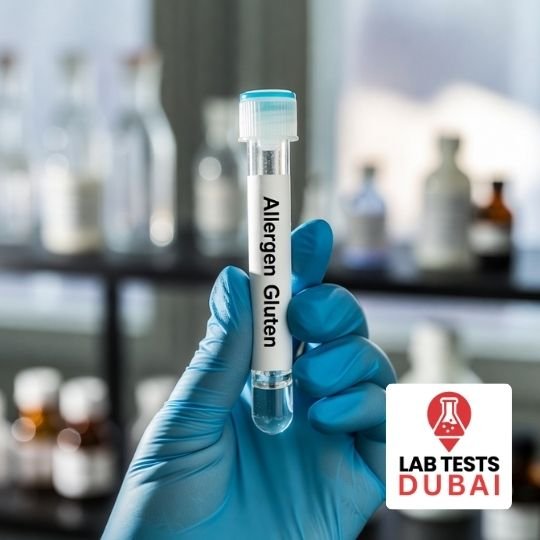Allergen Gluten Lab Test – Fast & Accurate Gluten Sensitivity Detection
450,00 د.إ
The Gluten Allergen Lab Test from Lab Tests Dubai is a comprehensive blood panel designed to identify immune reactions to gluten and wheat.
Sample Type : Serum
Methodology : Chemiluminescence
TAT : 10 Days
Description
Allergen Gluten Lab Test – Fast & Accurate At-Home Gluten Sensitivity Detection
The Gluten Allergen Lab Test from Lab Tests Dubai is a comprehensive blood panel designed to identify immune reactions to gluten and wheat, helping diagnose:
- Celiac disease (autoimmune)
- Wheat allergy (IgE-mediated)
- Non-celiac gluten sensitivity (NCGS) (diagnosis of exclusion)
Gluten, a protein in wheat, barley, and rye, can trigger serious health issues in susceptible individuals. This test uses advanced chemiluminescence technology to measure:
- Anti-tissue Transglutaminase IgA (tTG-IgA) – gold standard for celiac
- Total IgA – to rule out deficiency
- Deamidated Gliadin Peptide (DGP) IgA/IgG – for children or IgA-deficient
- Wheat-specific IgE – for true wheat allergy
Available with home blood collection, Lab Tests Dubai ensures accurate, private, and stress-free testing, so you can get answers without disruption to your life.
Why You Need This Test
If you’re experiencing chronic bloating, fatigue, or skin rashes after eating bread or pasta, this test could reveal a serious immune or autoimmune reaction.
You need the Gluten Allergen Test if:
- You have diarrhea, bloating, or abdominal pain after gluten
- You suffer from unexplained fatigue, anemia, or weight loss
- You have dermatitis herpetiformis (itchy, blistering skin rash)
- You have a family history of celiac disease or type 1 diabetes
- You suspect a wheat allergy (hives, swelling, anaphylaxis)
- You’re being evaluated for autoimmune or digestive disorders
This test helps:
- Confirm or rule out celiac disease
- Diagnose IgE-mediated wheat allergy
- Guide a gluten-free diet with medical backing
Early detection = prevention of intestinal damage and long-term complications.
Symptoms That Indicate This Test
Consider the Gluten Test if you experience:
✅ For Celiac Disease:
- Chronic diarrhea or constipation
- Bloating, gas, abdominal pain
- Unexplained weight loss or malnutrition
- Iron-deficiency anemia, osteoporosis
- Fatigue, brain fog, joint pain
- Dermatitis herpetiformis (gluten rash)
✅ For Wheat Allergy:
- Hives, itching, or swelling within minutes
- Wheezing, coughing, nasal congestion
- Nausea, vomiting, diarrhea
- Anaphylaxis (severe, life-threatening reaction)
✅ For Non-Celiac Gluten Sensitivity (NCGS):
- IBS-like symptoms (bloating, pain)
- Headaches, fatigue, mood changes
- No positive celiac or allergy tests
Note: This test detects celiac and wheat allergy, NCGS is diagnosed by exclusion and symptom improvement on gluten-free diet.
Natural Production: How Your Body Reacts to Gluten
Gluten is not produced by the body, it’s a plant protein found in:
- Wheat, barley, rye
- Processed foods, sauces, medications
Reactions vary by condition:
🔹 Celiac Disease
- Autoimmune disorder: Immune system attacks tTG enzyme in the small intestine
- Triggered by gliadin (gluten component)
- Causes villous atrophy, nutrient malabsorption
- Linked to HLA-DQ2/DQ8 genes
🔹 Wheat Allergy
- IgE-mediated: Rapid release of histamine
- Symptoms: Hives, swelling, anaphylaxis
- Can be outgrown (especially in children)
🔹 Non-Celiac Gluten Sensitivity (NCGS)
- No autoimmune or allergic mechanism
- Diagnosis after ruling out celiac and allergy
This test measures specific antibodies to differentiate these conditions.
What Happens If Untreated? Risks of Ignoring Gluten Reactions
Ignoring gluten-related disorders can lead to:
⚠️ Celiac Disease Complications:
- Intestinal damage & cancer risk (enteropathy-associated T-cell lymphoma)
- Osteoporosis, infertility, neurological issues (gluten ataxia)
- Other autoimmune diseases (thyroiditis, type 1 diabetes)
⚠️ Wheat Allergy Risks:
- Anaphylaxis – life-threatening without epinephrine
- Eosinophilic esophagitis (EoE) – chronic inflammation
⚠️ Malnutrition & Poor Quality of Life:
- Anemia, vitamin deficiencies, chronic fatigue
The good news? All are manageable with:
- Strict gluten-free diet (for celiac & NCGS)
- Wheat avoidance & EpiPen (for allergy)
Early testing = lifelong health protection
How to Prepare for the Test
To ensure accurate results:
✅ Continue eating gluten – at least 1-2 servings per day for 6–8 weeks before testing
❌ Do NOT go gluten-free before testing – can cause false-negative celiac results
✅ No fasting required
✅ Inform your doctor of:
- Recent infections or steroid use
- History of IgA deficiency
- Current medications
A serum blood sample is collected via standard draw, available at our labs or via home collection.
Test Overview: High-Sensitivity Chemiluminescence Method
Test Components:
- tTG-IgA – Primary marker for celiac
- Total IgA – Rule out IgA deficiency
- DGP-IgA/IgG – Alternative for children or IgA-deficient
- Wheat-specific IgE – For immediate allergy
Results are reported with clinical notes for your gastroenterologist or allergist.
If you’re tired of bloating, fatigue, or rashes after eating bread, the Gluten Allergen Test gives you the answers you need in just 10 days.
Frequently Asked Questions – Gluten Allergen Lab Test
What does the Gluten Allergen Lab Test measure?
This comprehensive blood panel measures four key markers:
– Anti-tTG IgA (gold standard for celiac disease)
– Total IgA (to rule out IgA deficiency)
– Deamidated Gliadin Peptide (DGP) IgA/IgG (for children or IgA-deficient individuals)
– Wheat-specific IgE (for true wheat allergy)
Can this test diagnose non-celiac gluten sensitivity (NCGS)?
No. There is no validated blood test for NCGS. This panel detects celiac disease (autoimmune) and wheat allergy (IgE-mediated). NCGS is diagnosed by excluding these conditions and observing symptom improvement on a gluten-free diet.
Do I need to be eating gluten before the test?
Yes! You must consume at least 1–2 servings of gluten per day for 6–8 weeks before testing. Going gluten-free beforehand can cause false-negative results for celiac disease, as the immune response requires ongoing gluten exposure to be detected.
What symptoms suggest I need this test?
Celiac disease: chronic diarrhea, bloating, weight loss, anemia, fatigue, dermatitis herpetiformis.
Wheat allergy: hives, swelling, wheezing, or anaphylaxis within minutes of eating wheat.
NCGS: IBS-like symptoms, brain fog, headaches, but only after ruling out celiac and allergy.
How soon will I get my results?
Thanks to Chemiluminescence methodology, results are typically available within 10 business days. You’ll receive a secure digital report with all antibody levels and clinical interpretation, ideal for sharing with your gastroenterologist or allergist.
Is this test covered by insurance in the UAE?
Please check with your insurance provider to confirm if this test is covered in your plan. We do not accept insurance directly but we provide reimbursement forms.





Reviews
There are no reviews yet.